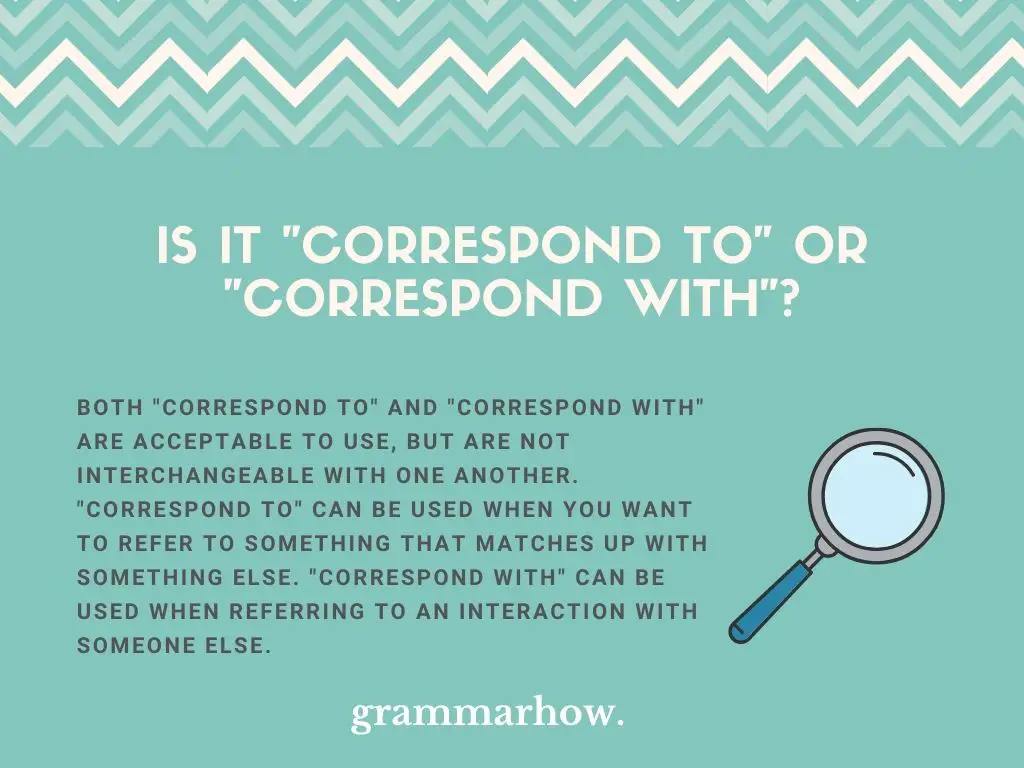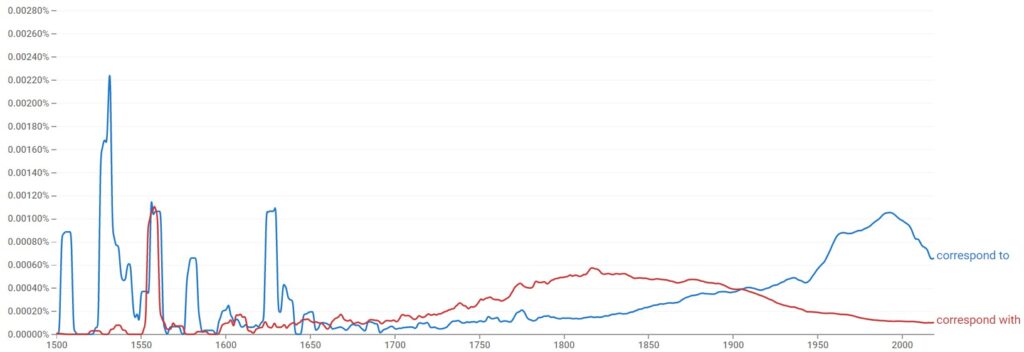When you want to refer to something, whether it’s data, communications, shared information, or even just work schedules, there are a lot of ways to do so. The word “correspond” offers many ways to do so and can be used in a variety of ways. However, the ways “correspond” can be used are not interchangeable.
Is It “Correspond To” Or “Correspond With”?
Both “correspond to” and “correspond with” are acceptable to use, but are not interchangeable with one another. “Correspond to” can be used when you want to refer to something that matches up with something else. “Correspond with” can be used when referring to an interaction with someone else.

“Correspond to” is used when something matches up with something else, such as two sets of data or the schedules of two people. When something is found to be matching, agreeing with, or harmonious with, it is correct to use the phrase “correspond to”.
“Correspond with” is used to refer to the communication, interaction, or shared information between two parties who are not currently face-to-face. This can be through letters, emails, phone calls, messages, faxes, or any other form of communication used between two parties.
When Should I Use “Correspond To”?
When you are looking to use the phrase “correspond to”, keep in mind the designated usage for the phrase. Make sure to remember to use “correspond to” only when referring to two or more things having information that matches up, is harmonious, or agrees with the other sets of information.
Here are some great examples of how to correctly use the phrase “correspond to” in a sentence.
- The numbers written in the index correspond to high-traffic areas on the map.
- The data from your experiment was found to correspond to the data from a similar experiment done several years prior.
- The food the two of them made was tailored to correspond to the tastes of the guests present.
- The rise in the number of illnesses spreading was found to directly correspond to the schedule of the airline arrivals.
- He was told he would receive a number that would correspond to the toad he had placed his bet on.
When Should I Use “Correspond With”?
When you are referring to an interaction, communication, or information you have shared with another person or party, you should use the phrase “correspond with”. This shows you are engaging in activity with another person, party, or sharing information with others.
In case you are in need of examples of how to correctly use the phrase “correspond with”, some helpful references have been provided below.
- The items I received do not correspond with the list of items I had ordered.
- She was nominated as the one who would correspond with the other team when necessary.
- The music he was loaned did not correspond with his idea of David.
- Jessica would frequently correspond with her friend who had moved out of state by writing letters.
- The results of their experiment did not correspond with the information their teacher had given them for what the results should be.
Is “Correspond To” Or “Correspond With” Used The Most?
According to this Google Ngram Viewer, a helpful tool for comparing words and phrases over time, the phrase “correspond to” is used the most. This was not always the case and only came about at the very beginning of the 1900s.

From the 1660s all the way to the early 1900s, the phrase “correspond with” was the more popular choice out of the two phrases. However, once the 1900s arrived, the phrase “correspond to” became substantially more popular, and “correspond with” has continued to dwindle in its usage.
Is It “Corresponding To” Or “Corresponding With”?
Both “corresponding to” and “corresponding with” can be used depending on the situation in which you are using them. If you are matching something with something else, such as data, you should use “corresponding to”. If you are referring to an interaction, you should use “corresponding with”.
Here are some great examples of how to use the phrase “corresponding to” in a sentence.
- The corresponding data has shown a link corresponding to a rise in dysautonomia diagnoses.
- The decrease in the stock market is currently corresponding to increased levels of depression and suicide over the past several months.
- The example shown on the second chart will be directly corresponding to several of the questions on your test tomorrow, so pay attention.
Below are some references you can use to see the phrase “corresponding with” being used correctly.
- The class is now corresponding with a different class in another country by becoming pen pals.
- The color of the honey is corresponding perfectly with the flowers we planted for the bees to visit.
- The biology department and the chemistry department have been corresponding with each other for the past few weeks.
Is It “Correspondence To” Or “Correspondence With”?
The phrases “correspondence to” and “correspondence with” are both acceptable to use, but cannot be used interchangeably. Use the phrase “correspondence to” when referring to something such as matching data. Use the phrase “correspondence with” if you are referring an interaction or communication with others.
Below are some examples for reference on how to use “correspondence to” correctly.
- The school curriculum was changed in correspondence to the decline of the GPA of students for the past several years.
- Conspiracy theories have increased proportionately in correspondence to the moon landing.
- In correspondence to the data you have presented, we have decided to continue funding your research.
Here are some great references on how to use the phrase “correspondence with” in a sentence.
- I have been in correspondence with the manager of this department and they have assured me there the shoes I am looking for are in stock now.
- After four years of correspondence with him, he finally met up with his gaming friend after discovering the two of them lived relatively close.
- Her correspondence with him ended due to her letter being placed into the wrong mailbox without either of them knowing this.

Martin holds a Master’s degree in Finance and International Business. He has six years of experience in professional communication with clients, executives, and colleagues. Furthermore, he has teaching experience from Aarhus University. Martin has been featured as an expert in communication and teaching on Forbes and Shopify. Read more about Martin here.
